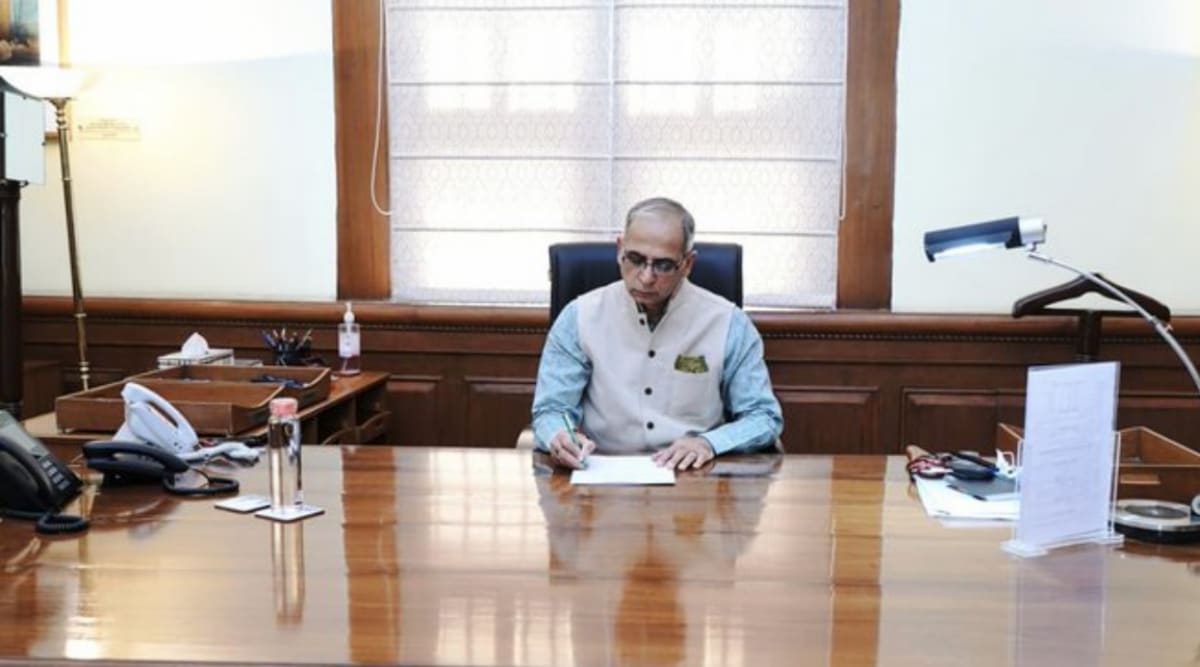 India's new foreign secretary Vinay Mohan Kwatra (Twitter/@ANI)
India's new foreign secretary Vinay Mohan Kwatra (Twitter/@ANI)A diplomat who had the shortest tenure in history in Pakistan has become India’s foreign secretary. Vinay Mohan Kwatra went to Karachi as Consul in May 1993 but returned after just five months.
It was one of the worst periods in India-Pakistan relations. Kwatra arrived in Karachi when tit-for-tat expulsions of each other’s diplomats were routine. Abductions of High Commission staff also took place. In May 1992, Rajesh Mittal was dragged out of his car by a posse of 15 suspected Inter-Services Intelligence (ISI) personnel in full view of his family. After being tortured for several days, the diplomat was expelled. The canard was that he was caught accepting classified documents from a Pakistani contact. The residence of Kwatra’s boss, Rajiv Dogra, the Consul-General in Karachi was ransacked. Fourteen months after Kwatra’s sojourn in Pakistan ended, the Benazir Bhutto government ordered the closure of the Indian Consulate in Karachi, calling it a “centre for sabotage, subversion and terrorism”.
When Narendra Modi was new to external affairs as prime minister in 2014, Kwatra was his unofficial interpreter for several months. The two had many occasions to discuss Kwatra’s experiences at Indian missions abroad. His brief, but haunting, experiences in Karachi stood out, according to persons privy to those conversations.
Kwatra’s subsequent three years as First Secretary at the Embassy in Tashkent interlocked with his work in Karachi. After the Taliban seized power in Afghanistan in 1996, Uzbekistan emerged as the most important centre of anti-Taliban planning and activity for the opposition Northern Alliance. Concurrently, Tajikistan was the source of support for Tajik Afghans. India became a strong supporter of the Northern Alliance.
Best of Express Premium
Having heard his interpreter’s accounts of those days, Modi considers Kwatra a fervent patriot with a worldview which is very similar to his own. The new foreign secretary’s views also conform to those of External Affairs Minister S Jaishankar.
Kwatra’s final challenge was Nepal. When he brought around Nepali politicians as ambassador in Kathmandu, ending the turbulence of recent years in India-Nepal relations, he emerged as the front-runner to succeed Harsh Vardhan Shringla as foreign secretary.
At the Lal Bahadur Shastri National Academy of Administration in Mussoorie, Kwatra earned the nickname “KTP” — “keen type probationer”. There were only four probationers in his batch who did not have degrees in international relations or humanities. As a post-graduate in science, Kwatra spent all his time in Mussoorie as a keen student of what he lacked among other probationers.
The nickname stuck. An all-consuming keenness to absorb even the minutest details of subjects remained first nature to him long after he left Mussoorie. In Washington, where this writer’s posting as a foreign correspondent overlapped with the three years that Kwatra spent as Minister (Commerce) at the Indian Embassy, only two IFS officers in recent years have been able to knowledgeably tell the Americans what their laws meant.
One is Kwatra, the other is Jawed Ashraf, who succeeded Kwatra in Paris and is the current Ambassador. I have watched Americans look at both Kwatra and Ashraf incredulously and in grudging approval, as they quoted American laws to defeat arguments from the US side that went against Indian interests. With the former, it was anti-dumping rules or the Generalised System of Preference, with the latter, it was US nuclear legislation when the nuclear deal with the George W Bush administration was being negotiated.
In Tashkent, Kwatra lamented that India’s private sector was risk-averse. Although New Delhi had a head start in Central Asia in the 1990s when the breakaway republics from the Soviet Union were formed, the Chinese have since got the better of Indian commercial interests, partly for this reason. Besides, the Chinese government backs their entities to the hilt in forays into new frontiers in a way the Indian government does not. Economic diplomacy can, therefore, be expected to be an important part of the new Foreign Secretary’s agenda, given his personal experience in matters of commerce and business.
The writer was a foreign correspondent based in Washington for 15 years.
- The Indian Express website has been rated GREEN for its credibility and trustworthiness by Newsguard, a global service that rates news sources for their journalistic standards.

